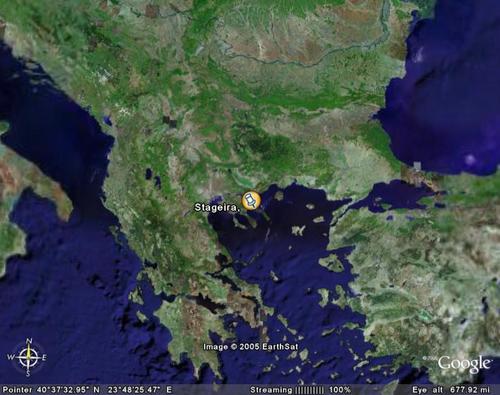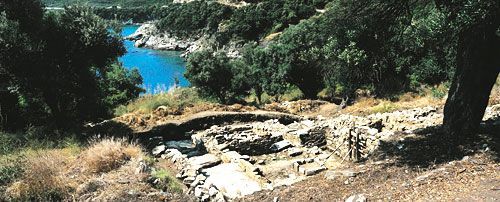Aristotle applied readily today.
Aristotle applies readily today. He observed that ‘kings should … be chosen … with regard to their personal life and conduct.’ Observers of Prince Charles’s private life in Great Britain take note. Across the Atlantic one also finds a criterion that applies. ‘Whenever the chiefs of state deem anything honorable, the other citizens are sure to follow their example’ (The Politics, p. 58 at 1273a40). Think of President Bill Clinton. In both cases, the polity teaches.
Socrates and Plato were suspected of Spartan sympathies because of their dislike of Athenian mob rule, known as democracy. Aristotle, too, had a whiff of the alien about him. First he was not Athenian, and never would be. He was resident foreigner in Athens. Born in far north at Stageria. 
A long way from Athens indeed. When Athenian resentment of Alexander the Great, away in the orient on campaign, grew, Aristotle left Athens for Assos near his birth place, saying that he would not let Athens sin against philosophy twice, referring to the judicial murder of Socrates. However little students know of ancient history, Athenian democracy basks in a warm glow in their minds. That Plato, Socrates, Aristotle, and Thucydides criticized Athenian democracy makes them suspect to a student today.

From the site of ancient Stageria. A statue of Aristotle in a garden there. 
This statue is in Thessaloniki where the Aristotle University is.

In repose. The University. 
The imbecilic documentary “The Greeks” narrated with an urgent pomposity by Liam Neeson gets it all wrong. See the raves on IMDB http://www.imdb.com/title/tt0272971/
Makes me doubt the sense of a great many people. Athenians democracy was, without Pericles, mob rule. Victorious generals were murdered so that their prizes could be distributed to the mob. Losing generals dared not return to Athens. Members of the mob voted eagerly for war on more than one occasion, comfortable in the knowledge that they would never fight it, the land battles would be carried by the property owners – mostly farmers, and the sea battles by mercenaries. On Monday the mob decide to kill every citizen of an island state, say 8,000 men women and children, and on Tuesday reversed itself. Who dares think about Wednesday? Indeed on more than one occasion the mob (yes, alright, the legally constituted Athenian assembly) did decide on collective punishment of whole cities for not anticipating their every wish. Mytiliene and Melos are but two of the more well known instances.
To be continued.

I had no idea of the travesty that was Athenian mobocracy.